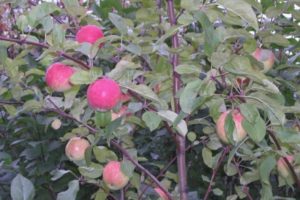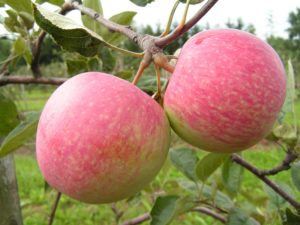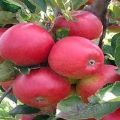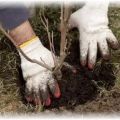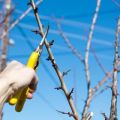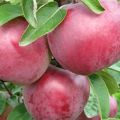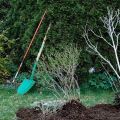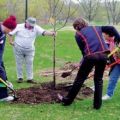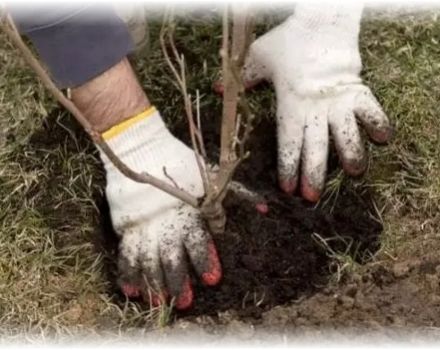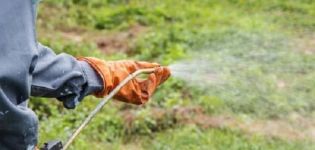How to properly prune a columnar apple tree in summer, spring and autumn, formation and care
Columnar apple pruning is carried out according to a certain scheme, observing the required crown shape. The procedure can be successfully carried out by gardeners in any season. The main thing is to prepare the necessary tools, take into account the recommendations of experienced gardeners and carry out the technology. Thanks to pruning, it is possible to improve the quality of the crop and increase its quantity.
Description and characteristics of the variety
Often they began to meet in the gardens columnar varieties of apple trees... They take up little space and decorate the site. A characteristic feature is the presence of one trunk, from which short, thick shoots extend. Fruits are formed both on the lateral branches and on the central trunk.
Distinctive features of columnar apple trees:
- Most trees grow no more than 3 meters in height, but there are specimens that grow up to 5 meters.
- Almost all varieties of apple trees do not tolerate cold winters. If the crown kidney is damaged, the development of culture changes. The shape of the crown and the taste of the fruit change.
- The compactness of the culture allows it to be planted in an area where there is little space.
- Fruiting begins two years after planting.
- The roots are close to the ground.
- High productivity.
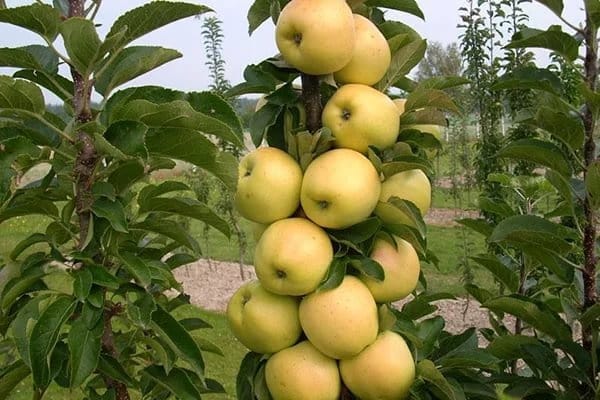
It is easy to care for columnar apple trees, but there are also distinctive features:
- the root system of columnar apple trees creeps close to the surface of the earth, therefore, frequent watering is required;
- high demands on feeding;
- it is impossible to loosen and weed the soil around the trunk;
- it is recommended to plant a lawn near the trunk, which will retain moisture and heat.
The disadvantage of a columnar culture is a relatively short growing season. After 12 years, it ceases to bear fruit.
Why you need to prune
To understand whether it is necessary to prune a columnar apple tree, it is important to understand the growth characteristics of this culture.
The main part of the columnar apple is the kidney apex. If it is not frozen or damaged, then the shoots of the tree will grow short and the tree will look compact. There is no need for pruning.
The cause of kidney loss is frost, improper fertilization. Sometimes gardeners cut off the top by mistake. In this case, the rapid growth of lateral shoots begins, and in order to save the harvest, pruning is carried out.

The formation procedure has many positive aspects:
- the correct shape of the apple tree is formed;
- the likelihood of branches tangling is excluded;
- young branches grow and develop well;
- there is a rejuvenation of the fruit crop;
- the number of crops increases and the quality of fruits improves;
- the appearance of the culture is improved.
In order for all these points to be realized, it is necessary to trim correctly.
In addition to proper formation, care consists in regular watering, timely fertilization and treatment from pests and diseases.
When to start pruning an apple tree
The terms for each apple variety are individual. For early summer varieties, the fall months are the recommended timing. It is recommended to prune apple trees with medium ripening in winter. Late varieties are best formed in spring.
You need to form the crown correctly. Usually, in each season, the procedure is carried out with one specific purpose:
- The main pruning is considered to be carried out during the winter months. The most successful time for the procedure is the end of winter.
- Spring pruning is done to determine the main trunk. The procedure is best done after flowering.
- In the summer months, unnecessary branches are removed.
- In the autumn, thickened sections of the crown are thinned out, removing strong vertical branches.
Pruning is carried out at any time of the year, starting from the second year after planting the seedling.
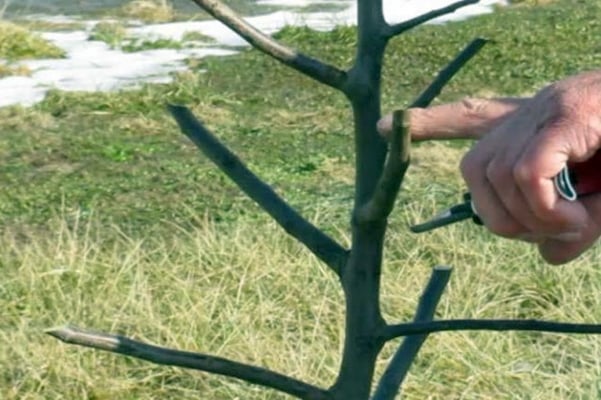
What tools will be needed
Formation of a columnar apple tree is carried out with well-sharpened garden tools. To trim the crown, you need to prepare a disinfectant:
- a sharp knife is useful for removing very thin branches and burrs;
- thin branches are removed with pruning shears;
- to remove the upper branches, you will need a pruner with long handles;
- stairs.
The cut site is immediately treated with disinfectants that are applied with a brush. Garden var, garden acrylic paint, Bordeaux liquid are suitable. Solutions are made on the basis of components such as copper sulfate, potassium permanganate.
Schemes and forms of correct cutting
The pruning of the pyramidal apple tree is not carried out strongly and does not involve the main shoot. Lateral horizontal and vertical branches should be formed. It is on them that the crop ripens.
Pruning branches is carried out in two directions:
- part of the shoot is cut off;
- in the second option, the branch is cut off completely.
The vertical branch grows stronger and faster. Horizontally located shoots grow more slowly, but they have more flower buds, this feature was the basis for the pruning procedure.

It will take 5 years to form a beautiful crown and increase yields. The general scheme for pruning a tree, which will be within the power of novice gardeners, involves the following steps:
- some time after planting, the trunk is shortened and the lateral shoots are removed, it is better to carry out the work in early spring before the juices begin to move (in the first year of growth, it is better to cut off all the lateral shoots so that two buds remain on each);
- the next year, the central trunk is not touched, and the lateral shoots are shortened to a length of 28 cm (the upper shoot must be left to serve as a continuation of the main trunk);
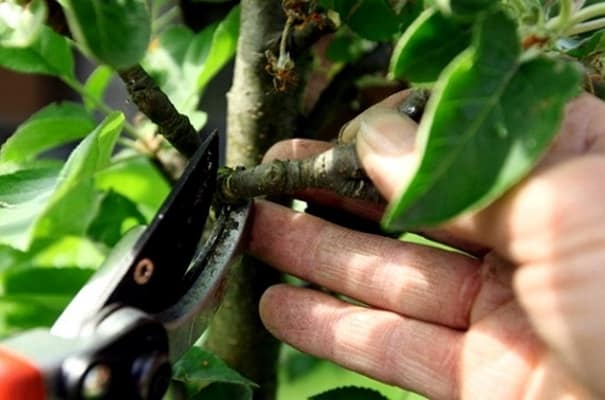
- a year later, all the weakened branches are cut off, and those that remain are shortened to 38 cm;
- in the fourth year, only weakened, damaged and dry branches need to be removed;
- in the fifth year, it is recommended to remove the top to limit growth (by this time the height of the apple tree will be about 3 meters).
In the future, there is no longer a need for pruning. Only dry, diseased branches are removed.
Cropping options
In the process of formation, either the side branches or the top are cut off. It is better to cut lateral branches in summer or spring. The procedure involves several stages:
- A year after planting, you need to cut off all the shoots, except for the top, leaving two buds.
- A year later, new shoots appear from the buds left. The branch that will grow vertically is cut again. Again, only two buds are left. Another branch, which grows more in a horizontal position, is left to form the crop.
- In the following season, the horizontal branch from which the crop was harvested is completely removed.
- In the sixth year, the entire fruit branch is completely removed, since by this time it has exhausted all its resources.
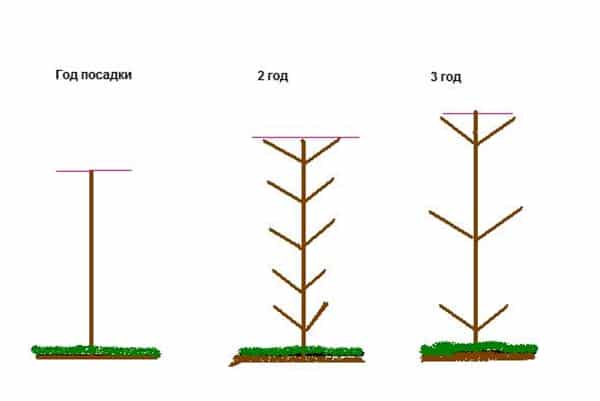
Pruning of the crown shoot is carried out when it is frozen. The main task is to determine the strongest shoot that grows upright. It is he who will become the continuation of the main trunk. The rest of the shoots are removed according to the standard scheme.
By winter, a tree with trimmed branches must be insulated using a covering material.
Technique of the procedure
The weak point in a columnar apple tree is the top. For normal development, it is important to protect the apical kidney from adverse factors. During the period of spring formation, it is important to determine the strongest shoot, which is left for further development, and all the rest are removed.
To carry out the procedure correctly, it is important to observe the following recommendations:
- remove only young shoots that are not more than a year old;
- the cut is made in the direction from the base of the branch to the top;
- the cut is made 12 mm above the kidney;
- the incision is made neatly and evenly, taking care not to damage the bark.
You need to trim the branches carefully, taking care not to damage the bark. Do not make too deep cuts.
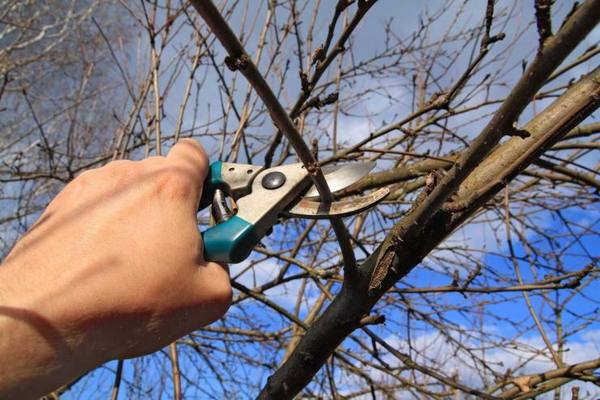
Winter pruning of apple trees
In winter, when there are no leaves on the tree, pruning is easier. All areas are visible, moreover, you can be sure that the tree is at rest. The main purpose of winter pruning is to bring the lower branches to the upper half of the tree. During winter formation, dry, weak and damaged branches are simultaneously cut, and a fruiting zone is formed.
The columnar apple tree does not have permanent branches. Since their growth is cylindrical, the conditions for development are not very favorable for the lower branches. They receive little light and do not bear fruit. It is better to prune shoots on days when the air temperature does not drop below -10 degrees.
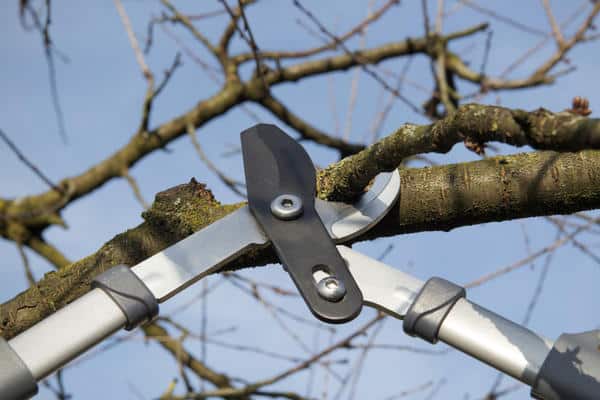
Spring
To enhance tree growth and crown formation, spring pruning is carried out. The best period is the middle or last days of March. It is important to carry out the procedure before the start of the movement of the juice. Correct pruning involves leaving 4-5 buds on each branch.
After winter, the tips of the branches that are frozen are also removed. Pruning allows you to rejuvenate the tree and increase its resistance to adverse factors.
Summer
In the summer months, unnecessary shoots with leaves that grow from the main trunk are removed. They absorb nutrients and moisture, interfering with the development of branches with fruits.
The branches of the columnar apple tree are easily removed by plucking. Small shoots should be removed with extreme caution, since the tree tolerates one large wound better than several small ones.
Autumn
Autumn pruning is carried out after the cessation of the movement of the juice. The procedure is started only after all the leaves have fallen from the tree. First, dry and damaged branches are removed, then shoots that have twisted are removed. The procedure will make it easier to transfer the winter culture.
